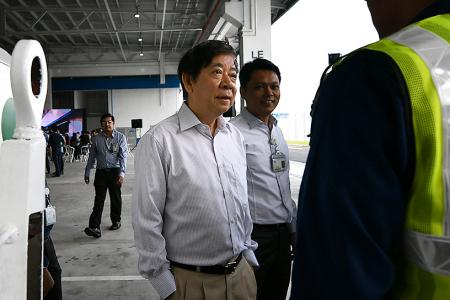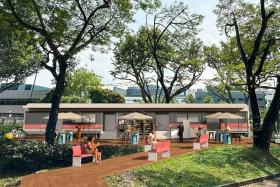Khaw: Trains will be more reliable by 2019
Half the core systems on North-South & East-West lines to be upgraded by then
While the entire overhaul of the North-South and East-West lines (NSEWL) will be finished only in 2024, commuters can expect "vast improvements" in reliability by 2019, Transport Minister Khaw Boon Wan said yesterday.
By then, three out of the six core systems of the 30-year-old lines would have been replaced, with each upgrade making a "quantum improvement" to reliability, he said.
Mr Khaw, who is also Coordinating Minister for Infrastructure, was giving a speech during a ceremony at Bishan Depot to mark the completion of the second major NSEWL renewal project - the replacement of the power-supplying third rail along around 180km of tracks.
The upgrade to a newer and more robust design started in 2015, with the final section near Ang Mo Kio MRT station replaced last month.
The upgrade has led to an improvement. As of Sept 5, there were three rail-related defects that resulted in delays of more than five minutes, compared with 16 last year.
The first renewal project, a four-year effort to replace sleepers, was completed last year.
Mr Khaw said that this made it "two down, with four more to go", referring to the outstanding upgrading of the signalling system, power supply system and track circuits, and replacement of 66 first-generation trains.
He said the works will take up until 2024 to complete because of the limited engineering time of three hours each night.
He noted the North-South Line (NSL) has seen greater improvement than the East-West Line (EWL) because the former was mostly upgraded first.
In the first half of this year, reliability on the NSL - according to the mean kilometre before failure (MKBF) measurement - improved by more than 120 per cent over the same period a year ago, hitting 345,000km.
In comparison, the EWL improved by 94 per cent.
The MKBF measures the average distance travelled between delays of more than five minutes.
In July, Mr Khaw raised the MKBF target for the MRT network to one million km by 2020. Yesterday, he said he was confident when he raised the target.
He said: "When I set targets two years ago, that we would match Taipei (metro's) 800,000 train-km... I was not confident - I was probably reckless."
Mr Khaw attributed his optimism to the different working environment today, one in which the regulator and operator work hand in hand.
He also said he hopes the testing of the NSL's new signalling system will be completed soon and that intensive testing of the EWL's new signalling system will start in December.
Singapore Institute of Technology assistant professor Zhou Yi said commuters can expect a smoother ride by 2019.
"Most of the current faults are due to signalling issues. There might be some teething issues up till 2018, but they should be reasonably stabilised by 2019," Dr Zhou noted.
Khaw: Bukit Panjang LRT built as an 'afterthought'
The Bukit Panjang LRT (BPLRT), which opened in 1999, was an "afterthought" to a built-up town, and constructed because of "political pressure", Transport Minister Khaw Boon Wan said yesterday.
"No LRT is designed that way, in such a masochistic manner, when you force yourself up and down (with) twists and turns," he added, alluding to the structure of the BPLRT, which has several sharp bends over undulating terrain.
Quipping that the BPLRT is like a "roller coaster", he added: "I have taken the BPLRT a few times as a commuter. I won't say I enjoyed the ride, (it) caused me dizziness also."
Pointing to last Saturday's disruption on the BPLRT caused by rail support brackets being "sheared off", Mr Khaw reiterated that the reliability of the 18-year-old system is on the Government's radar.
In March, it was announced that the line will get a complete overhaul, with new trains, power rail, signalling system and other components.
Mr Khaw said it was not feasible to scrap the BPLRT and do with a bus-only system, as the capacity would be insufficient.
The 7.8km BPLRT, which has 14 stations, was built at a cost of $285 million.
Asked about Mr Khaw's comments, Holland-Bukit Timah GRC MP Liang Eng Hwa said: "I appreciate the minister's candidness and him not giving up on improving the BPLRT's reliability. It is a daunting engineering challenge, and we know the system may take some time to achieve desired reliability." - THE STRAITS TIMES
Get The New Paper on your phone with the free TNP app. Download from the Apple App Store or Google Play Store now




